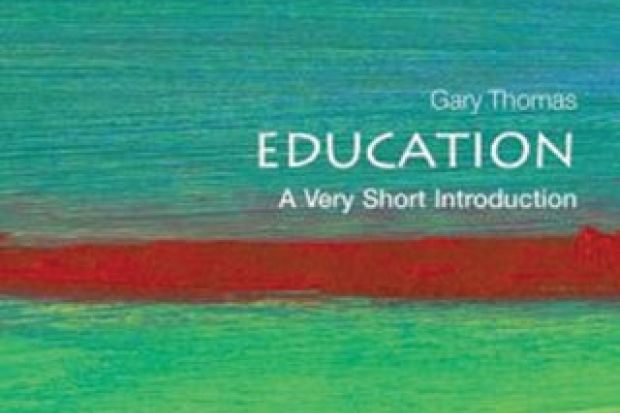In the opening lines of Education: A Very Short Introduction, Gary Thomas notes that few people know much about why schools function as they do today: about the intellectual ideas that have influenced their development; about the principal figures from history who have shaped how we teach; about the curriculum; and about the political and economic forces that have at times inflicted such corrosive damage on education. The book promises to throw light on these issues, and it does so in spades.
One of the big questions that continually surfaces in discussions about education is the origin and standing of formal versus progressive teaching. This debate cuts to the very core of what matters in schools: what is the point of education? What is it for? Is education about knowledge and skills, or is it about developing a critical, reflective stance? Put more starkly, do we send children to school to learn facts, or to learn how to think? This, of course, raises questions about how children learn (and how they can be put off learning) and Thomas provides a highly accessible overview of key theorists - from behaviourists (such as B.F. Skinner) to developmental psychologists (such as Jean Piaget and Lev Vygotsky) and how their ideas have influenced teaching methods. There are also vivid accounts of educational developments dating from ancient Greece and Rome, which convincingly demonstrate how little has changed over the millennia.
In the final chapter the gloves are off. Schools are described as being run on military lines and Thomas laments the ‘achievement-oriented, educationally barren models of the West’
Thomas’ writing style is characterised by a welcome lightness of touch. For example, we are told that Jean-Jacques Rousseau’s child-centred, progressive ideas shocked the world and that his books were “flying off the shelves in 18th century Paris”. There are also delightful, laugh-out- loud moments. My personal favourites include the discussion of the British psychologist Susan Isaacs’ interest in young children’s play, with Thomas commenting that she “looks rather like the love-child of Locke and Rousseau (if we allow for some gender reconstruction)”. And when considering why schools are so unsuccessful despite all the time and money invested in them, Thomas wryly comments: “As President George W. Bush put the problem so memorably in 2004, ‘Then you wake up at the high school level and find out that the illiteracy level of our children are appalling.’ Quite.”
Throughout this concise work - part of the publisher’s long-running and useful Very Short Introduction series - the narrative style is handled skilfully and the reader warms to the author’s personality and his informed, witty take on key issues.
In the main, the arguments are presented with a sense of balance (for example, Thomas points out that teachers aren’t either progressives or formalists - they tend to switch styles according to the needs/mood of the class). But in the final chapter the gloves are off. The book culminates with a passion and force that is palpable. Schools are described as being run on military lines and Thomas laments the “achievement-oriented, educationally barren models of the West”. There is a reminder that failure at school is caused by poverty rather than “difficulties” residing in the child, and that we seriously let down 40 per cent of pupils in the UK who leave school without GCSE examination passes in English and mathematics at grades A* to C. And there is a powerful section on the prescience of Ivan Illich’s views from the 1960s and his radical proposals for closing down schools.
Would this book be of interest to education academics as well as those who may not have any special background in the subject? The answer is a resounding yes. The reader is taken on a journey that touches seamlessly on key figures and historical developments, and that results in a flow of ideas that meld together with a perspicacity and clarity - so much so that complex topics and processes become connected in ways that even knowledgeable and well-informed readers may not have considered.
It’s a real gem of a book that pulls ideas together, that challenges and inspires - and that makes you laugh. Highly recommended.
Education: A Very Short Introduction
By Gary Thomas
Oxford University Press, 160pp, £7.99
ISBN 9780199643264
Published 28 March 2013
Register to continue
Why register?
- Registration is free and only takes a moment
- Once registered, you can read 3 articles a month
- Sign up for our newsletter
Subscribe
Or subscribe for unlimited access to:
- Unlimited access to news, views, insights & reviews
- Digital editions
- Digital access to THE’s university and college rankings analysis
Already registered or a current subscriber? Login




